21 Plants That Repel Ticks: Fresh Smells We Love & Ticks Hate!
Author: Jen Worst | Editor: Omar Alonso
Review & Research: Jen Worst & Chris Miller

I've been planning some flower beds around trees (less weed-eating around big roots!) and next to the house and figured I should use some plants that repel ticks.
It's on my mind with the recent news about Lyme disease. I know a couple of people that have come down with that disease and it sounds simply terrible.
I live in a very wooded area and absolutely hate petting the dog or cat only to find a big bump in their fur. I'm sure you can all relate, finding a big tick on the back of your head or in your arm pit.
With that I started researching plants ticks hate. Deterring them from even entering the property should go a long way to keeping them off myself and my little pet buddies.
Let me share with you what I discovered. Most sites only list a few of these plants that deter ticks, but since I always enter my completionist research mode, I managed to turn up a lot more than three or four.
What Plants Repel Ticks?
Below is a quick list of plants that repel ticks due to their chemical makeup. The upside is we love them. They include wonderfully smelling flowers, tasty herbs, and visually gorgeous plants.
Please read carefully though, because some of these can be toxic to your pets, especially if we're talking about a cat that likes to wander through the flower bed.
Lavender

Everybody (but ticks) enjoy the rich purple color of lavender as well as its fragrance. Mosquitos and moths apparently hate it too, which makes it a triple threat of a flower to grow in your yard.
We love it so much it's in air fresheners, used as a culinary herb, an essential oil, in traditional medicine, and even in cosmetics.
You probably already know if you're one of the rare few, but lavender can irritate eczema or facial dermatitis when applied directly to the skin.
If that's you, it's best to avoid growing it or at least wear gloves and take care not to touch your face when working in the garden.
Also, it can induce nausea and vomiting in your pets if they ingest it, so please be aware as you plant various types of lavender around your flower beds.
Pennyroyal
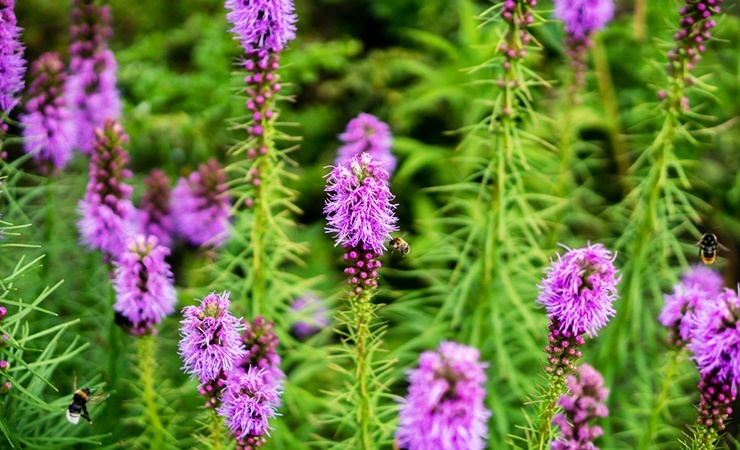
Mentha pulegium, or Pennyroyal, is another member of the mint family and a natural tick repellent. It's among the more effective plants that mosquito and ticks dislike, but watch it because it can spread quickly. And because it grows so easily, that's a double warning.
Fortunately it's fairly attractive. The bulbs have a "fuzzy" type of flowing with pretty light purple leaves and pistils. They grow in tiers and will have flowering up along the stalk. I like them and think they look great in a more wild yard where they're allowed to grow tall.
Garlic

This one may even repel you! I have friends that want more and more garlic in their food, and others that can't stand it. If you can't stand it, you might be a tick, because they also hate this plant.
Like other herbs mentioned in this post, you can later crush the cloves and use them in the kitchen. If you don't do that, you can consider crushing them up and tossing it around borders of your yard as they move out of season.
Sage

This perennial herb is often used as a companion plant to repel ticks, fleas, and other insects due to it's odor. Notice I didn't say fragrance because some people can't stand it while others (like me) love it.
Once I discovered it as a cooking herb, I fell in love and have grown it in my kitchen window sill since.
If you like the smell, great. It's also non-toxic to dogs and cats. It's not particularly pretty but can bring a lot of green to an herb garden or flower bed. But better yet, it runs off those pesky blood-sucking insects.
Beautyberry
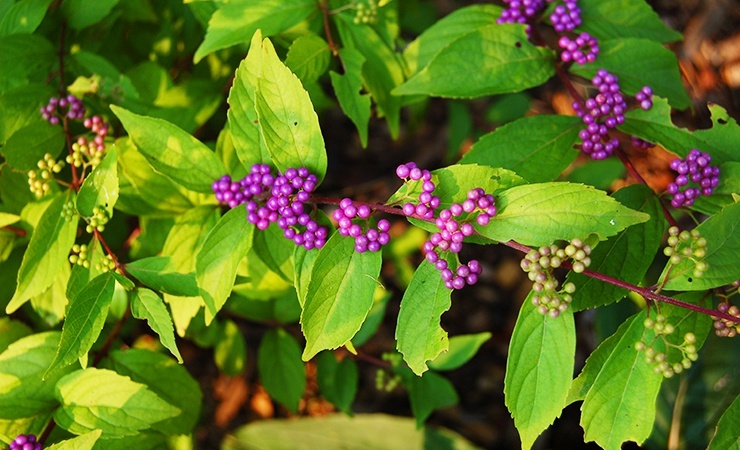
Beautyberry bushes are so pretty. They have small purple berries growing along them, but it is the leaves that act as the natural insect repellent. Deer ticks, mosquitos, and even ants will stay away from these plants.
The USDA's Natural Products Utilization Research Unit found that it's almost as effective as DEET, including a 100% repellency of black-legged ticks for three hours.
Chrysanthemums

Chrysanthemums contain a chemical called pyrethrum that is a natural pesticide for fleas and ticks. It totally shuts down their nervous systems, so they stay as far away as possible.
You'll see these called mums, sometimes. They're beautiful, coming in various bright colors like pink, orange, purple, and yellow.
They can brighten up any garden with their big colorful bulbs that flower into spheres. They keep tons of pests away and look so good, there's zero reason not to include them in your tick-repelling mission.
These can cause vomiting and diarrhea in pets if they're dumb enough to eat it.
Eucalyptus
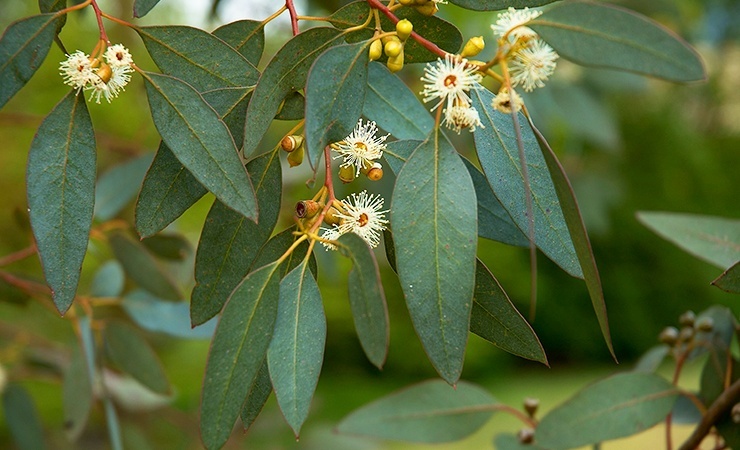
Eucalyptus oils, like peppermint and citrus oils, repel ticks greatly. You can grow these into bushes or even trees. The oils that run off our insect enemies come from the leaves, but the wood and leaves are used in tons of industries.
Depending on the sub-types of eucalyptus you grow, they can look real refined as trees or can be far more like a shrub and a mess you need to maintain. But either way they get the job done that we're looking for.
Mint

People suggest planting mint in pots rather than in the ground due to how quickly and aggressively it spreads. That's not a huge problem because it smells wonderful and drives away insects. The aromatic oil in the leaves are what gets the job done.
Many people say that containers of mint placed on your porch or around your yard can do wonders in driving off insects, mainly ticks and mosquitos. Sounds like a great replacement for screening in your patio!
Rosemary

Like sage, some people don't like the smell of rosemary while others think it's the bee's knees. I think it looks cool and I love it when the purple / blue flowers begin to bloom.
What I like best is the prospect of repelling ticks while planting something I would have planted anyways. When your pets brush against it, it'll add some repellent to their coat, too.
Rosemary is a very common culinary herb, so if you're into that you can pull double duty and dry it out, crush it in a mortar and pestle, and add it to your dinner.
You've heard the song "Parsley, Sage, Rosemary, & Thyme." Those four simply go together, the opposite of me and insects.
Wormwood

Known as Artemisia absinthium, it was once (and I guess still is) used to make an intoxicating drink. For the same reason, ticks don't like it due to the way the smell and chemicals make them feel.
Wormwood grows into a shrub that can be up to three feet high, so think of this less like a plant and kind of like a bush. When in bloom, the flowers are a pretty yellow. But all in all it's not that attractive of a plant, in my opinion. But the ticks hate it!
Catnip
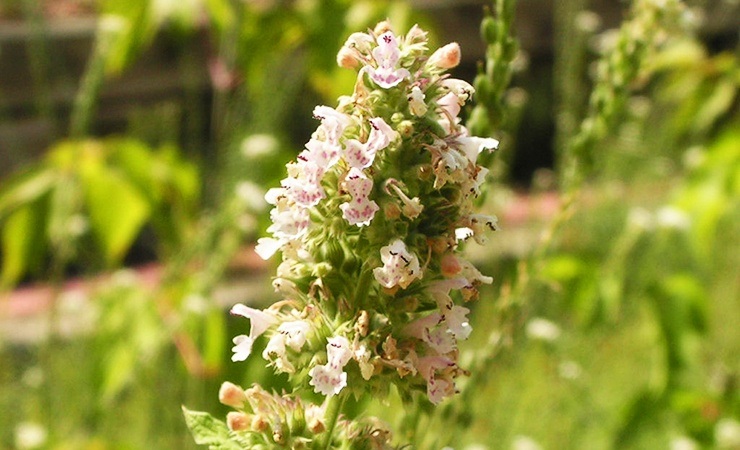
Obviously, your cat will love you for planting this tick deterrent. Not only do ticks despise catnip, but so do cockroaches and mosquitos. Some people suggest crushing up dried catnip (the kind you buy at the store) and rubbing it into your cat's fur. I don't go this far.
Another issue is your cat can get real hyper around these and tear up your garden, so don't plant them too close to other flowers. Also, you may possibly attract other neighborhood cats, which isn't typically an issue unless they're feral.
Rue
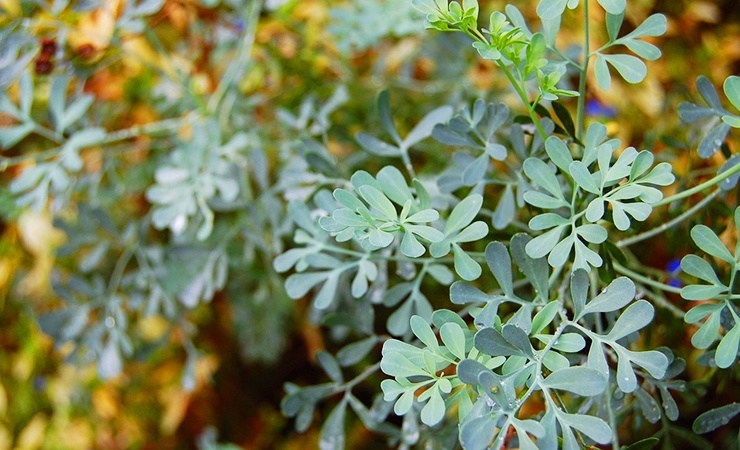
Rue is an evergreen herb that has blue / metallic leaves. Not only does it act as an insect repellent but it also has antifungal and antimicrobial properties, helping out the other plants around it. Flies, beetles, and slugs dislike this as much as ticks do.
Their smell drives all kinds of bugs crazy, especially ticks and fleas. Cat's don't like it either so you don't have to worry about them tearing up the plants. Just don't plant it next to your catnip if you want your feline friend to enjoy it.
Fleabane Daisy
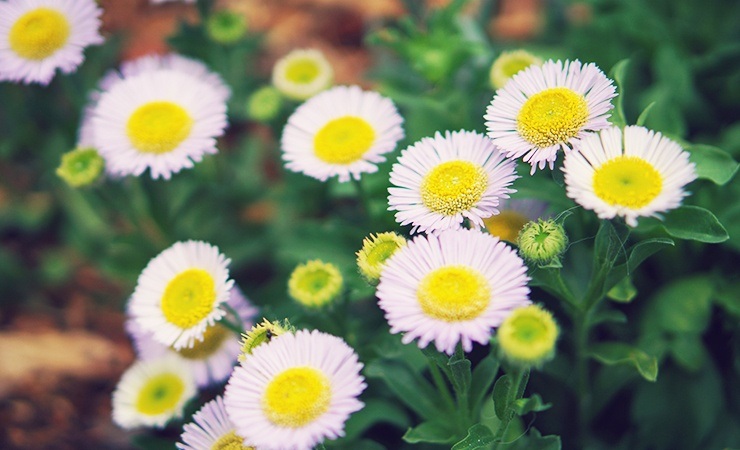
Obviously from the daisy family, the fleabane daisy is a tall flower very similar to chamomile in appearance, though they can include white and pink shades of flowers.
They fit into any garden but look great against walls, particularly. They have a cosmopolitan distribution, largely in grassland and dry mountainous regions.
The name tells you exactly what they're good for. They are the bane of ticks and fleas, or so people say. Some call it superstition, and others swear by their efficacy. Give it a shot, who cares! They look great regardless.
Lemongrass
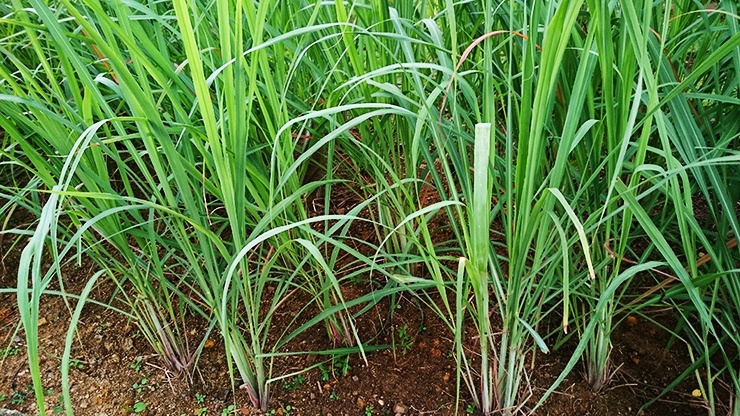
You know about citronella types of candles to keep flying insects away. Citronella is a natural oil that comes from lemongrass, which is an ornamental grass that can grow up to four feet tall. It's an annual that many people plant around their sidewalks or against their homes.
It's used in culinary dishes too, like Chinese chicken and pork recipes and in soups. Please know that lemongrass can cause stomach upsets in your pets.
I think these look a lot better in a pot than in the grass, myself, probably because I grew up having to maintain it at my parent's house.
Geranium
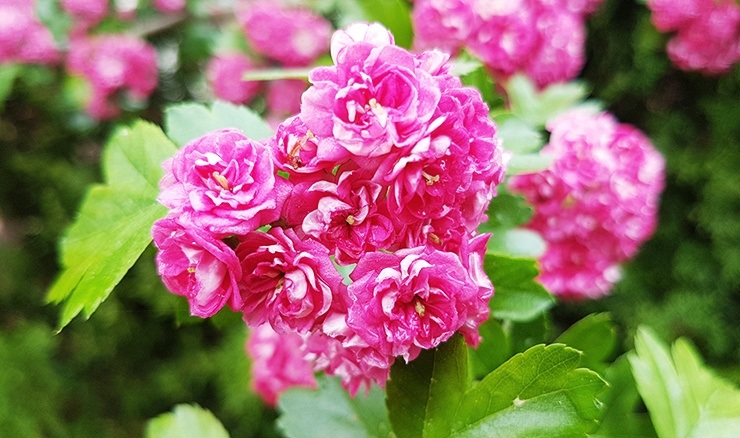
Geranium, especially rose geranium, are great mosquito repellents but keep ticks at bay as well. They grow fast, especially in sunny and dry areas. They look great in flower beds or as decorations in and around vegetable gardens.
Growing up, we'd find this growing wild in fields all the time. All types of geraniums are gorgeous with small, colorful flowers. You probably recognize them from the photo above. They can have a "wild" appearance, but the flowers are so pretty.
Mexican Marigolds
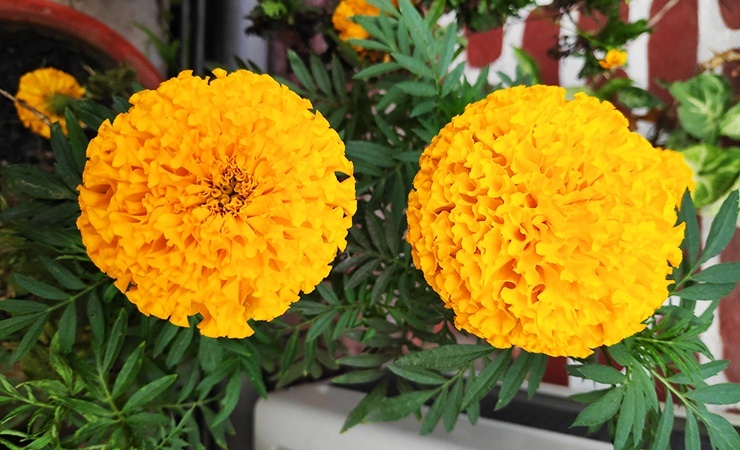
The nice thing about all the types of marigolds are they're easy to grow due to their hardiness. They'll grow in nearly any conditions and are great at repelling whiteflies, nematodes, and of course ticks.
Unless you get up close, you won't smell them that obviously, but insects can smell the foilage and say "nope, not going in that yard today."
You'll rarely see a more beautiful flower. They're round and thick, ranging somewhere between yellow and orange in their petals. If you to look and can't find seeds or potted flowers, check for the alternate name, Aztec marigold.
Chamomile

Most people are aware of chamomile because it makes a wonderful, calming tea. But guess what else it does? You've got it, it keeps ticks away thanks to its fragrance.
They must be crazy, but hey, who am I to argue with parasites? The further away they are from me, the happier I am.
Not only do these yellow flowers with white petals bring a sense of innocence and joy to your garden, they supposedly have health benefits to surrounding plants, perhaps because they keep pests away.
I'll take it! Try making your own tea if you grow chamomile, but only drink it in the evenings.
Sweet Basil

Basil is another herb that is used for a ton of purposes, but ours is as a companion plant that drives away various types of insects. Make sure that you plant it in an area that receives at least six to seven hours of sunlight to help it thrive.
You want to know what plants repel ticks, so please make sure that if you plant basil for that reason that you choose sweet basil (Genovese basil). It has a strong scent of cloves that you'll appreciate, but our little tick friends will find disgusting.
It's an annual (as opposed to perennial) so you'll have to work to keep it around each year, but it's worth it.
Venus Flytrap
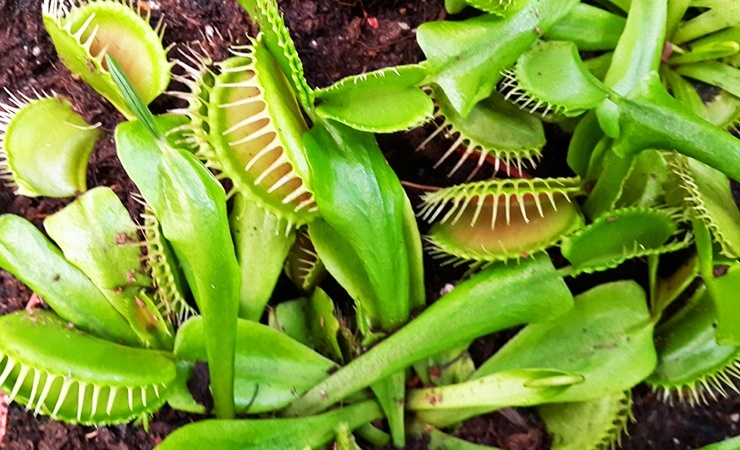
You may find these goofy (I do), but these crazy plants demolish ticks, fleas, and flies for breakfast, lunch, and dinner. They need direct sunlight and prefer high moisture. They're honestly kind of cool to have around.
I mean, what's not to like about a meat-eating plant with giant jaws and teeth that devour pests all day and night? It reminds me of "The Little Shop of Horrors" movie, though, so don't let them grow too large...
Thyme

Thyme is another tasty, perennial evergreen. I didn't realize this but it's a member of the mint family Lamiaceae and related to all the types of oregano. It's been around forever, even in ancient Egypt and Greece. It's been used as an incense for thousands of years, so you know it smells great.
You can use it for its main purpose, as a culinary herb, but for us, I'd leave it for the length of its lifetime due to its power in keeping ticks away. When it flowers, it has small, white petals that bring a nice feel to an otherwise boring yard, fence border, sidewalk, or flowerbed.
Sunflowers

It's said that the vitamin B1 found in sunflower seeds repels ticks. I'm not clear if you need to crush up the seeds to have the oils seep out or what, but either way I think all types of sunflowers are wonderful. I'm a big fan of tall and big flowers.
Getting up close and really taking in the beauty of the intricate sunflower flower is an amazing experience. The best part is you can always take some to your mother in a vase for her birthday or Mother's Day.
Plants Ticks Hate & We Love
Thankfully we love the plants that ticks hate. But why are people concerned with repelling ticks? Let's talk about some some of the basics of why these insects can be devastating to our lives.
Ticks are a type of arachnid (like spiders), part of the Parasitiformes order, closely related to mites in the subclass Acari. They are parasitic, engaging in hematophagy, meaning they live by feeding on the blood of larger animals and people.
They've been around since the Cretaceous period. We know this since we've found them fossilized in amber like on the Jurassic Park movie. They even snacked on dinosaurs.
There's two main families, called Ixodidae or hard ticks, and Argasidae or soft ticks. They have eight legs and a beak that contains the mouth, which is embedded in your skin to gain access to your blood.
The main problem with all this is that they're huge vectors of diseases and they are pervasive.
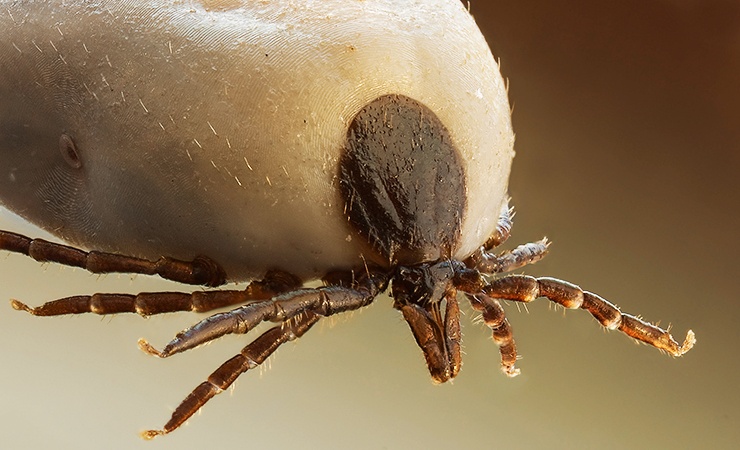
They're sinister. There's even ones called the spinose ear tick that get into the ears of animals like dogs and cattle. Tropical bond ticks are a big problem in Africa and the Caribbean.
In North America the Ixodes scapularis is how we end up with Lyme disease. They're mainly found in the ecotone, which is the transitional habitat between woodlands and grasslands.
That means a great way to keep the population down in your yard is to remove brush, weeds, and leaf litter in your yard, especially if you have trees. This gets rid of shade and moist areas where they deposit their eggs.
Plants That Deter Ticks & Their Diseases
Here's a list of just some of the diseases that are communicable by tick. They include pathogens, bacteria, viruses, and protozoa. The number is nearly endless, so here's just a sampling:
- Queensland tick typhus
- African tick bite fever
- Rocky Mountain spotted fever
- Lyme disease
- Q fever
- Colorado tick fever
- Crimean Congo hemorrhagic fever
- tularemia
- Bourbon virus
- Tick-borne meningoencephalitis
- Anaplasmosis
- Heartland virus
That's a tiny sampling. There's even stuff like the Australian paralysis tick that are venomous and cause tick paralysis.
The depth and breadth of the problems they can cause are life threatening in the immediate and in general, causing huge disruptions in life quality. Take for example the lone star tick that can cause red-meat allergies in their victims. It's ridiculous.
Plants That Keep Ticks Away Smell Great
The worst part about ticks is the diseases they carry. The second best part is they can be kept away easily by doing something you'd do anyways, which is maintaining a flowerbed or garden.
Notice I said second best before, because I was saving the ultimate benefit of all of our effort for last: we get left with amazingly colorful and wonderfully smelling flowers and plants in our yard.
Our pets will love it, our children will cherish it, and we can take joy from them and our own enjoyment.



